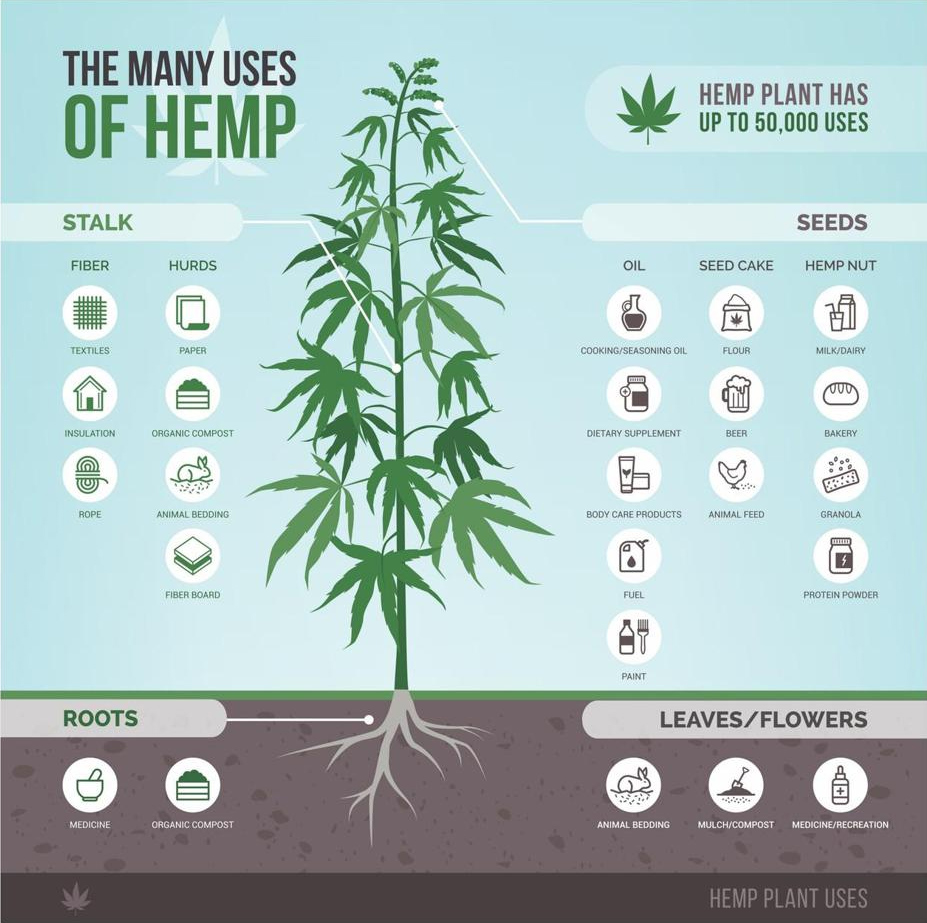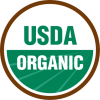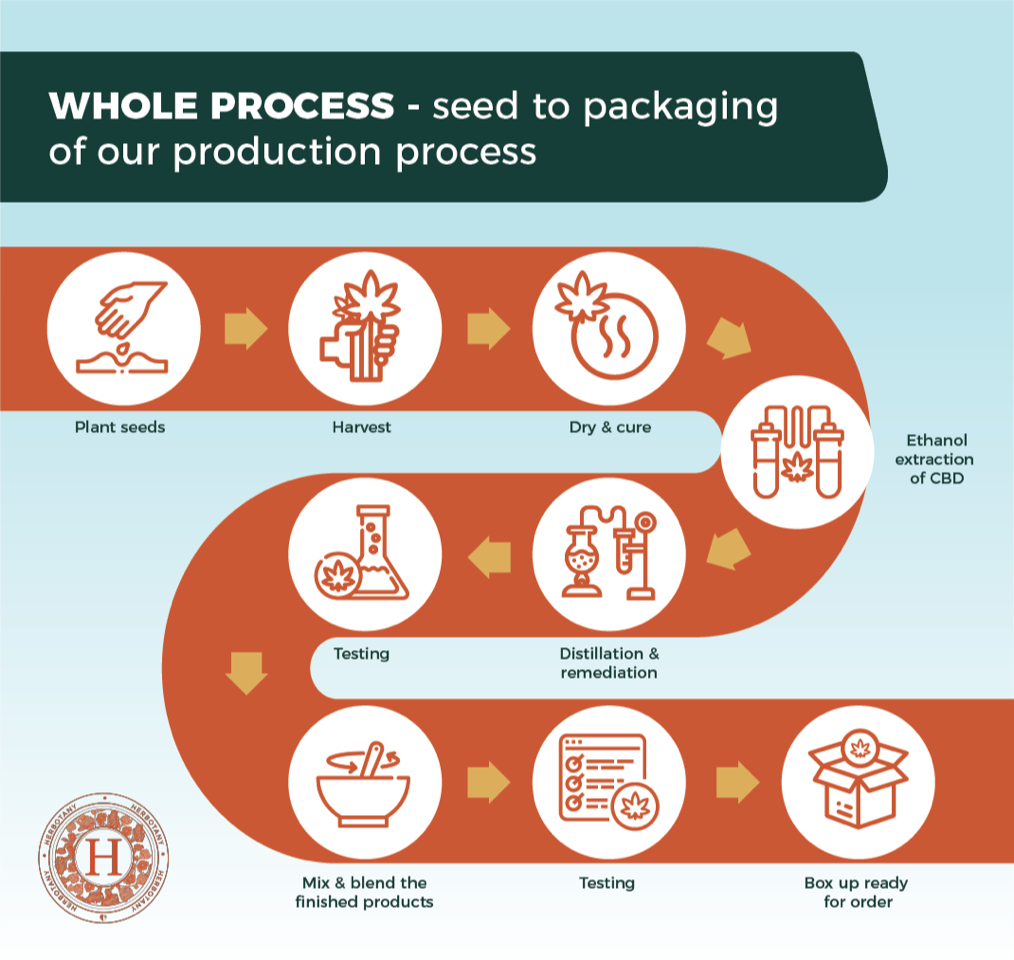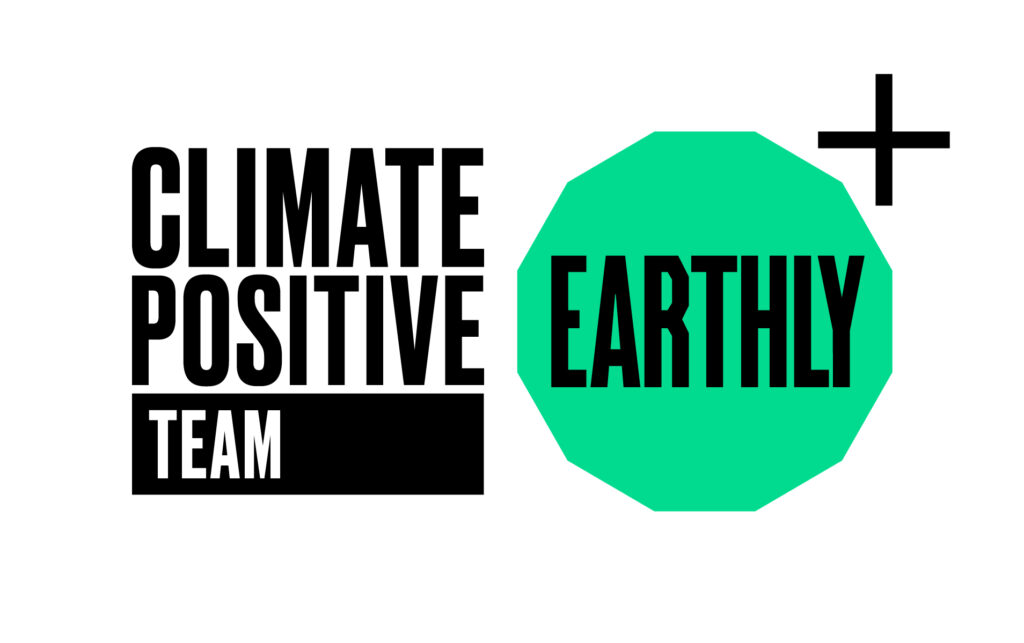Our passion
We like to define “sustainability” in terms of how natural systems function, remain diverse and produce everything that’s needed for the ecology to remain in balance. Sustainability is important for a very simple but vital reason: we cannot maintain our quality of life as human beings, the diversity of life on Earth, or Earth’s ecosystems unless we embrace it.
At Herbotany Health, we are passionate about sustainability and how everything we do and produce can make a difference.
Hemp as a plant
Hemp is an amazing plant, and we are proud to be working with the crop every day.
Hemp is one of the most versatile and synergistic tools available to tackle key environmental challenges, such as CO2 and land contamination. In fact, hemp bio-remediates contaminated soil and improves soil structure and nutrient levels with its long roots, which go deep into the ground and bring up nutrients that are normally locked in down there that other plant roots are unable to reach. This leads to greater yields in follow on crops, such as wheat and barley, due to the extra nutrients in the topsoil brought up by the hemp plants.

Studies have shown that hemp can be twice as effective as forests at sequestering carbon and is one of the best CO2-to-biomass converters. A recent study showed that “Industrial hemp absorbs between 8 to 15 tonnes of CO2 per hectare of cultivation. In comparison, forests typically capture 2 to 6 tonnes of CO2 per hectare per year depending on the number of years of growth, the climatic region, the type of trees etc.” (according to Cambridge University researcher Darshil Shah.)
Hemp also grows effectively without the use of pesticides or herbicides, due to the strong, tough make-up of the plants which means less pollutants in the local environment. It also needs minimal water compared to other crops and can grow up to 5 metres in 3-4 months.
Hemp is estimated to have up to 50,000 different uses and can be used in over 10,000 products, such as plastics and fuel. It is used as a sustainable raw material due to the fact that it is strong, durable and versatile, but is also bio-degradable.

Growing and Production
We grow all of our crops outside as this is the most natural and sustainable way of growing hemp for our CBD products. Although this has its limitations compared to growing our hemp inside, namely, that we can only grow one crop per year and our crops can be affected by extreme weather and pests, we still believe that it is the only way that the crops should be grown. Growing crops outside is how mother nature intended it and it has a positive impact on the environment, locking carbon from the atmosphere.

Our hemp is organically grown and USDA Organic certified, which means that no synthetic fertilizers, pesticides, or herbicides are used in the cultivation of our hemp plants. It also ensures that we are using tillage and cultivation practices that maintain or improve the condition of the soil and minimize soil erosion.
We use geothermal energy in our facilities as our primary energy source which reduces energy usage for unnatural sources. We also use LED lighting which is more eco-friendly than standard lighting.

Kentucky
We grow all of our hemp crops in Kentucky, which sits on a bed of gorgeous blue limestone that creates the ideal natural water for our crops. When water flows through the rock, it picks up minerals that add personality and flavour. Limestone also acts as a filter, eliminating bitter elements such as iron.
Kentucky also boasts some of the richest, most fertile soil in the world to grow crops on.
The state is known for its high-quality bourbon whiskey and strong, healthy racehorses. It is believed that because the horses drink the mineral filled water and eat the grass grown from the rich, fertile soil, that they grow big bones and stronger muscles which gives them the edge over horses bred in other states.
The Hindu Kush is a rocky, rugged and barren region at the border of Afghanistan and Pakistan along the 37th parallel of the equator, where it is believed that all indica strains of cannabis originated from. On the other side of the world, the same latitude line runs through the Kentucky hemp farm region which means that it has the same light cycles as those in the Hindu Kush mountains and makes it perfect for growing cannabis plants. Pair this with the rich, fertile soil in Kentucky, and you get some of the best cannabis crops in the world.
Packaging
Our cardboard box packaging is 100% recyclable and 100% compostable. The board contains a minimum of 80% recycled pulp. This is the highest possible percentage of recycled pulp that you can produce functional packaging with. The remaining material is from approved sustainable sources.
Our bottles are made from glass and are widely recycled.
We are minimizing plastic in the supply chain wherever we can. Biodegradable plastic is still a very challenging material to use in packaging, although progress is being made and we hope to implement this in our packaging in the future.
Climate Positive Team
Herbotany Health are proud to be a Climate Positive Team. Through our partnership with Earthly, we have calculated and offset all of our employee’s carbon footprint by investing in the Rumba Raya Peatland Protection Project.
“The Rimba Raya Biodiversity Reserve project is protecting one of the most highly endangered ecosystems in the world. Without this project, the carbon-rich, peatland forest of Rimba Raya would have been turned into palm oil estates, emitting over 100 million tonnes of carbon into the atmosphere. Instead, the project is protecting the land and working with local communities to achieve all 17 of the Sustainable Development Goals.”
See our dashboard through this link to view our contributions and positive impact https://teams.earthly.org/profile/Herbotany-Health

Goals for the future
We continue to strive for new ways to make our operations and products more sustainable. Here are some of the ways we plan to achieve this in the near future:
- Using recycled ocean plastic tops on our bottles
- Using labels that are made from hemp on all our bottles and packaging
- Reduce / eliminate the use of virgin materials in all operations
- Sending our products out in reusable packaging that can be sent back to us to use again

